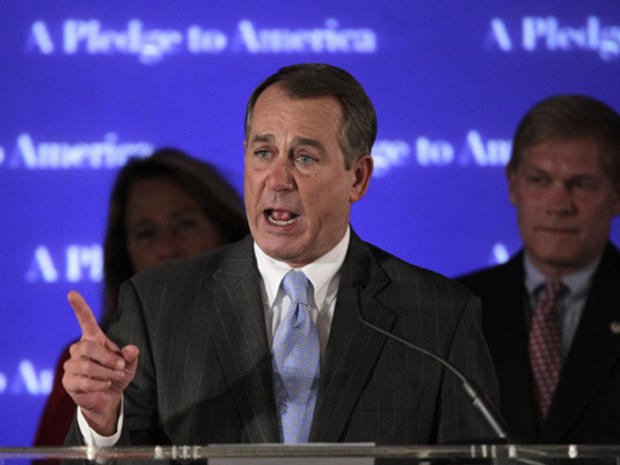Cost of Repealing Health Care Reform Estimated at $230 Billion Over 10 Years
Updated 3:13 p.m. Eastern Time
If enacted, House Republicans' bill to repeal President Obama's health care reform legislation would increase the deficit by roughly $230 billion through 2021, according to a preliminary analysis of the legislation by the nonpartisan Congressional Budget Office.
The CBO has not completed a full analysis of the repeal bill. Aware that the bill will soon be considered, however - the vote is set for January 12th- CBO director Douglas W. Elmendorf sent a letter to House Speaker John Boehner outlining the organization's preliminary analysis.
The fact that Republicans have rushed to vote on the repeal legislation without waiting for a CBO score (or hearings or other input) has been a sore spot for Democrats. But they can now point to the preliminary analysis, which finds that through 2019, repealing the bill would increase the budget deficit by $145 billion - a figure that Elmendorf writes likely won't significantly change in the final analysis. (The $230 billion figure comes when you add the estimated $80-90 billion costs of repeal over the 2020-2021 period.)
In the rules package they passed yesterday, Republicans exempted the costs of repealing the health care bill from requirements about addressing increases in federal spending. They maintain that CBO estimates that health care reform reduces the deficit resulted from "budget gimmickry," as House Majority Leader Eric Cantor said on CBS' "The Early Show" this morning.
House Speaker John Boehner said Republicans planned to release a report Thursday showcasing how the health care law "is already destroying jobs in this country." (Update: Here it is.)
"When you look at it dollar by dollar, you can tell that the numbers just don't add up," he said at a press conference Thursday morning.
Boehner also said the CBO, which is widely seen as fair and impartial by lawmakers in both parties, is "entitled to their opinion." He argued that CBO could not provide a full accounting of the costs of the bill because the legislation did not take into account the "doc fix" or
necessary discretionary spending.
Here's how the CBO explains its findings in the letter:
"The March health care legislation contained a set of provisions designed to expand health insurance coverage, which CBO and [Joint Committee on Taxation] estimated would have a gross cost of about $930 billion and a net cost (after accounting for certain related changes in outlays and revenues) of about $780 billion over the 2012-2019 period. Repealing that legislation would eliminate such costs. But [the health care legislation] also included a number of provisions to reduce federal outlays (primarily for Medicare) and to increase federal revenues (mostly by increasing the Hospital Insurance payroll tax and imposing fees on certain manufacturers and insurers); in March, CBO and JCT estimated that those provisions unrelated to insurance coverage would, on balance, reduce direct spending by about $500 billion and increase revenues by about $410 billion over the 2012-2019 period. If that legislation was repealed, such reductions in spending and increases in revenues would not occur. Thus, H.R. 2 would, on net, increase federal deficits over that period."
In response to the letter, Health Subcommittee Ranking Member Pete Stark (D-Calif.) released a statement hammering the repeal effort.
"The Republican NoCare agenda should come with a Surgeon General's warning: Dangerous to Your Health," he said. "Today, CBO confirmed the devastating effect their plan would have on the health of American families. If Republicans are successful, millions of Americans become uninsured, millions pay more than they should for their health benefits, and our deficit balloons. Republicans support an Insurance Company Bill of Rights -- not the Patients' Bill of Rights."
The CBO letter also suggests that enacting repeal "would increase federal deficits in the decade after 2019 by an amount that is in a broad range around one-half percent of GDP, plus or minus the effects of technical and economic changes that CBO and JCT will include in the forthcoming estimate. For the decade beginning after 2021, the effect of H.R. 2 on federal deficits as a share of the economy would probably be somewhat larger." That has prompted Democrats to suggest the long-term cost of repeal is more than $1.2 trillion.
Among the other findings in the letter are that 32 million fewer nonelderly people would have health insurance in 2019 if the law is repealed. (83 percent of nonelderly Americans would be covered, as opposed to 94 percent if the legislation stays in place.) It also finds that premiums for employment-based coverage from large employers would be slightly higher if the law is repealed and benefits would be reduced.
The projections, it should be noted, do not include the discretionary spending savings that would come with repeal - for example, the Internal Revenue Service and Department of Health and Human Services are projected to need as much as $10 billion each over ten years to implement the legislation. If it is repealed, that means a savings of up to $20 billion from those two agencies.
It's also important to note that repeal has no real chance of becoming law so long as Democrats control the Senate and White House. But Republicans, who have stressed their commitment to fiscal restraint, have been tying themselves in knots over the last few days to square that ostensible commitment with their push to repeal the health care bill. With the letter released today, that effort becomes that much harder.
